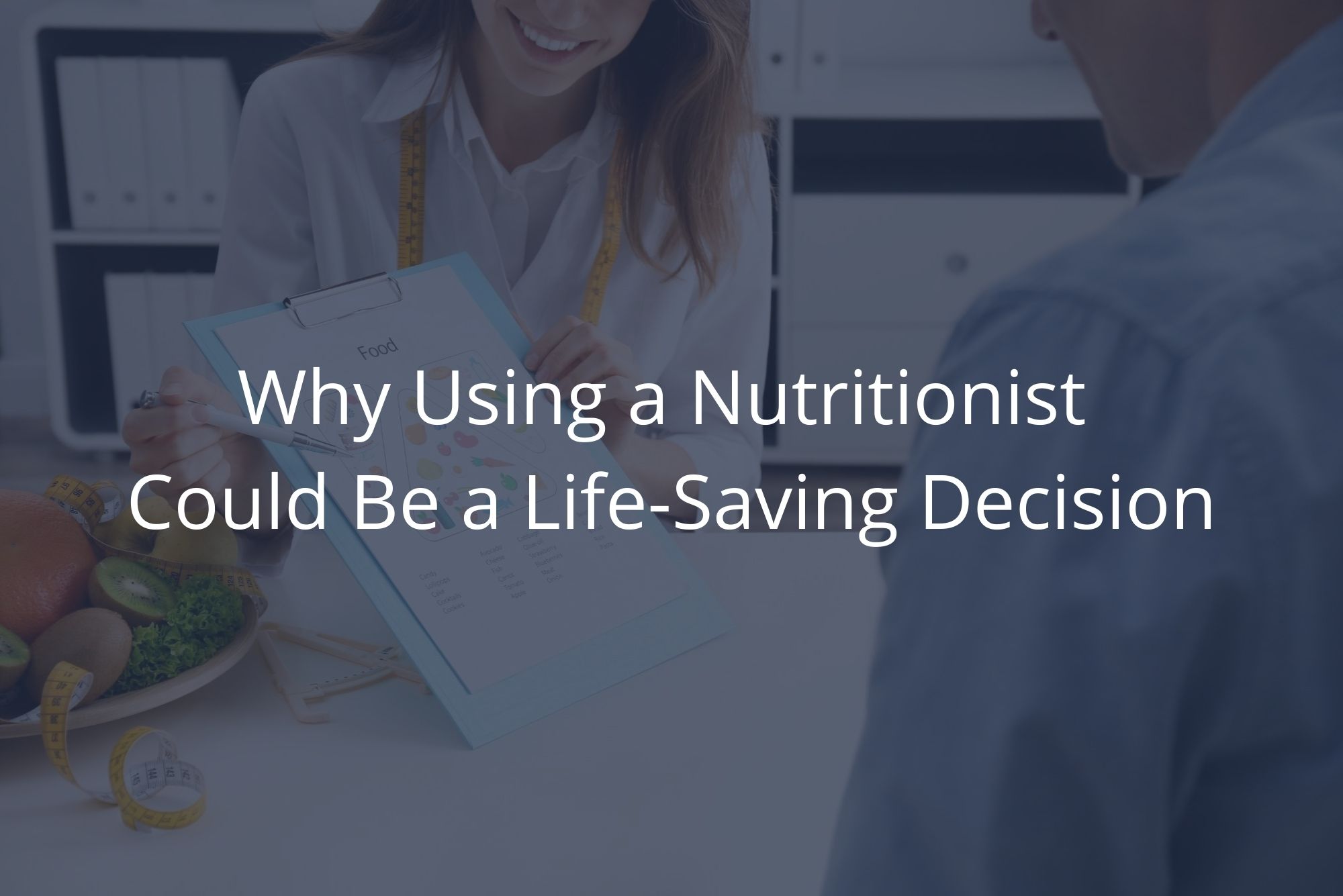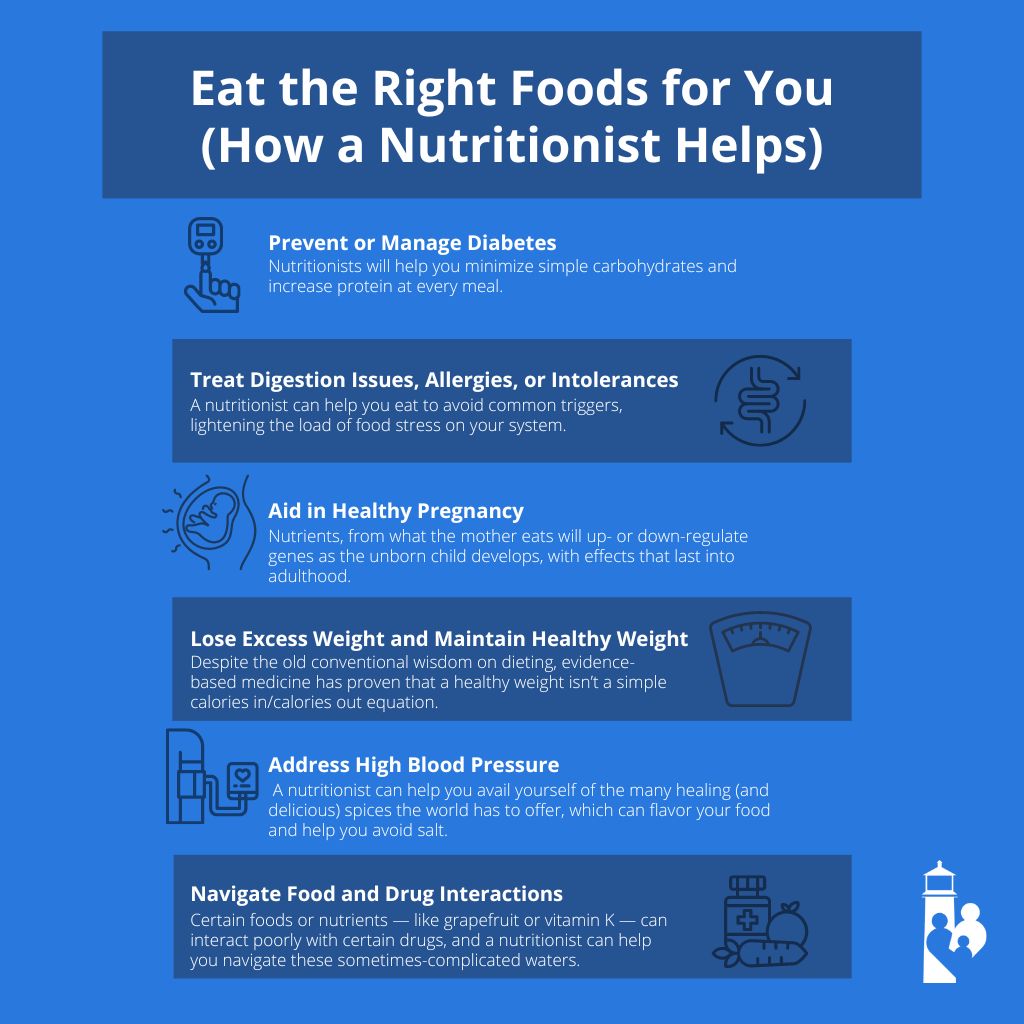
The four pillars of health — nutrition, sleep, exercise, and stress reduction — are the crucial components of life that we must care for in order to maintain our bodies in good order.
Today I want to talk about what is often one of the trickiest of the pillars for people to master: nutrition.
With all the overwhelming options available to people with food access in developed countries — convenience foods, mail-order pre-prepped meals, ever-changing fad diets based on dubious science — it’s no wonder navigating nutrition is a difficult undertaking!
It’s possible to be overfed and undernourished, to be making what you think are healthful dietary choices, while actually harming yourself.
Part of my job as a physician is to create customized health management plans for my patients. I don’t do that alone, and I often recommend help from other professionals to my patients to help them integrate our findings into their lives.
One of these professionals is a nutritionist.
A nutritionist’s help can prove instrumental in guiding you away from disease and back to health.
Let’s take a closer look at what a nutritionist can do for your health.
Should I See a Nutritionist?
First, what does a nutritionist do, and why should you see one?
The answer is simple: Nutritionists teach you how to eat to promote health.
Most of us have some basic ideas about how to eat healthy based on what we learned from our families, educations, and government recommendations. But much of that nutritional baseline stems from statistical health guidelines for the masses, not your individual health in particular.
A nutritionist creates personalized dietary recommendations tailored to you and your needs specifically.
And how they do that might surprise you.
What Can a Nutritionist Do for Me?
First, they’ll ask you to keep a food diary to record what you eat over a certain period of time. Reviewing this food diary will help them understand your usual eating patterns and food preferences.
They’ll also take a medical history and may request specific information from your physician. Once they know what’s going on with your life — your health state, existing conditions, and goals — they’ll make recommendations by applying the principles of our modern understanding of nutrition to your individual situation.
They’ll also introduce you to new nutrition concepts and reintroduce you to foods you already know.
Be prepared to re-think packaged and processed foods when you work with a nutritionist. Processing strips nutrients from foods during manufacturing, which is why those foods then need to be “enriched” with vitamins and minerals. Why do manufacturers have to add vitamin C to orange juice, for example? Because the vitamin C from the oranges was lost during processing.
Nutritionists will help you understand food in a new way and teach you how to choose nutrient-rich foods that supply your body with what it needs.
What To Look for in a Nutritionist
The term “nutritionist” is not nationally regulated in the United States, so it’s important to consider a nutritionist’s background and credentials.
For example, you can find registered dietician nutritionists (RD or RDN) and certified nutritional specialists (CNS), all of whom have completed an accredited educational program, supervised field work, and a certification exam. There are also nutritionists without these credentials, but with experience and certifications in other areas, such as functional nutrition.
The rules and requirements for nutritionists vary based on location, but you can find out each state’s regulations here.
I also suggest considering the specific services a nutritionist offers. Great nutritionists offer a high level of service that makes their recommendations practical and actionable. They’ll come to your house and peek in your pantry, see how you cook, and help you develop menus. They’ll even join you for grocery shopping.
A good nutritionist can also advise you about styles of food preparation. Just as packaged foods become altered during processing, fresh foods can also lose nutrients during cooking.
Olive oil, for example, undergoes a structural change once it’s heated past 350 degrees. Onions — which normally help “good” gut bacteria grow — lose their prebiotic properties if caramelized and, ironically, take on cancer-causing properties.
So it’s not enough to get nutrient-dense foods; you also have to prepare them in ways that keep them nutritious — and not harmful — to your body. Nutritionists can teach you how.
The Two Types of Nutrition
Really, there are two types of nutrition — recommended daily allowance (RDA) and what I call medicinal nutrition.
The RDA is the minimum amount of any nutrient you need to prevent a deficiency.
For example, for women over the age of 19, the RDA of vitamin C is 75 milligrams, whereas for men over the age of 19 the RDA is 90 milligrams. A vitamin C deficiency leads to many problems, including a potentially fatal disease called scurvy, so RDAs recommend enough vitamin C intake to prevent that from developing.
Medicinal nutrition values, on the other hand, are higher than what you’ll find with a bare minimum RDA.
Medicinal nutrition considers what your body needs to prevent, correct, or heal from an injury or disease. In these cases, you need enough nutrition to fix problems, not just to sustain levels or prevent deficiencies.
A nutritionist can help you with both RDAs and medicinal nutrition.
Eat the Right Foods for You (How a Nutritionist Helps)
Thanks to their educations, backgrounds, and expertise, nutritionists excel at using food to make improvements to your life and health. Here are some common ways they do it:
Prevent or Manage Diabetes
Nutritionists will help you minimize simple carbohydrates and increase protein at every meal. They’ll teach you how to choose healthy fats, like grass-fed butter, ghee, and olive oil, that help slow your absorption of carbohydrates and prevent swings in your blood sugar level.
Treat Digestion Issues, Allergies, or Intolerances
Most people have varying degrees of intolerance to refined sugars, gluten, and dairy. Inflammation is a common reaction, although an intolerance might occur without you being aware of it. A nutritionist can help you eat to avoid those common triggers, lightening the load of food stress on your system.
Aid in Healthy Pregnancy
A pregnant woman’s diet affects the genetic makeup of her growing baby. The nutrients that the mother eats will up- or down-regulate genes as the unborn child develops, with effects that last into adulthood.
Additionally, a growing baby gets first dibs on whatever the mother eats. If the mother doesn’t consume enough nutrients to support her and the child, then the mother is the one who suffers first. This means a pregnant woman needs to eat in a different way than she ever has before, and a nutritionist can help ensure she and the child get all the essential nutrients they need.
Lose Excess Weight and Maintain Healthy Weight
Despite the old conventional wisdom on dieting, evidence-based medicine has proven that a healthy weight isn’t a simple calories in/calories out equation. There’s much more at play here, including the role of certain nutrients and our metabolic rate. Specific functional medicine tests are able to diagnose problems with metabolism in order to promote healthy weight loss.
If you feel frustrated regarding weight loss, consulting a nutritionist could be an excellent next step.
Address High Blood Pressure
Many people know that salt consumption contributes to hypertension, or high blood pressure. A nutritionist can help you avail yourself of the many healing (and delicious) spices the world has to offer, which can flavor your food and help you avoid salt.
But there’s another dietary contributing factor to high blood pressure, and that’s processed and convenience foods. These foods require your body to work harder in order to detoxify certain additives; in so doing, they increase stress hormones, which can lead to high blood pressure.
Navigate Food and Drug Interactions
Anything we eat or drink must be metabolized through our liver and kidneys.
If you have prescription drugs that are taking up these detoxification pathways, and foods that require the same pathways, you can end up with too much drug absorption, or not enough of it.
Certain foods or nutrients — like grapefruit or vitamin K — can interact poorly with certain drugs, and a nutritionist can help you navigate these sometimes-complicated waters.
Food Is Fun
I’m not the first to say it, but food can be fun! In addition to being about nutrition, eating can be about community, tradition, and shared joy.
Making dietary changes sometimes seems daunting to people not only because of the work involved, but also because they’re afraid they’ll miss out on the fun of eating. But this is a major misconception!
Eating what you need isn’t about restriction or isolation. A nutritionist can help you find creative ways to incorporate flavors you love and avoid those you don’t, all while getting the nutrients your body needs to support feeling great and staying healthy.

Dr. David Rosenberg
Dr. Rosenberg is a board-certified Family Physician. He received his medical degree from the University of Miami in 1988 and completed his residency in Family Medicine at The Washington Hospital in Washington, Pennsylvania in 1991. After practicing Emergency Medicine at Palm Beach Gardens Medical Center for two years, he started private practice in Jupiter, in 1993. He is an avid baseball fan and Beatles fanatic, since he was 8 years old. He has been married to his wife, Mary, since 1985 and has three grown children.
David completed additional studies at Mercer University, Macon, Georgia and obtained a BS in Chemistry in 1983.
“My interests include tennis, snow skiing, Pilates and self-development.”

